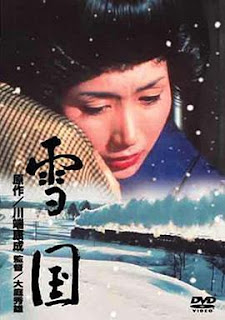49. Chit-sî Yukio káⁿ í-keng tūiⁿ-khùi
Shimamura chē ê ká-ná sī sáⁿ-mih hui-hiān-si̍t ê mi̍h-kiāⁿ, sit-khì sî-kan hām hūiⁿ-kīn ê kài-liām, poa̍h-lo̍h sit-sîn ê chōng-thài, kā chi̍t-kho͘ khang-khak hûn-su kau hō͘ i chài leh cháu. Tan-tiāu ê chhia-lián siaⁿ khai-sí ná-chhiūⁿ sī hit-ê cha-bó͘ ê kóng-ōe siaⁿ.
Hiah-ê ōe-siaⁿ bô liân-sòa koh chin kán-té, sī cha-bó͘ chīn-la̍t tih seng-oa̍h ê kì-hō. I thiaⁿ liáu sim-chêng tîm-tāng, bô hoat-tō͘ pàng bē-kì. M̄-koh, tùi hūiⁿ-hūiⁿ kiâⁿ khui ê Shimamura lâi kóng, che taⁿ put-kò sī cheng-ka lí-tô͘ kiâm-suiⁿ-tiⁿ ê iâu-oán ê siaⁿ-im.
Chit-má chit-ê sî-chūn, Yukio káⁿ í-keng tūiⁿ-khùi ah hoⁿh? Komako ná ē kian-chhî m̄ túiⁿ, sī-m̄-sī chū án-ne bô hām Yukio kìⁿ chòe-āu chi̍t-bīn?
Lí-kheh chió kah khí koài-kî.
Kan-ta chi̍t-ê gō͘-cha̍p chhut-thâu ê cha-po͘-lâng hām chi̍t-ê bīn âng-âng ê ko͘-niû tùi-bīn chē, nn̄g-lâng tih kò͘ kóng-ōe. Ko͘-niû bah-bah ê keng-thâu ûi chi̍t-niá ûi-kin, chhùi-phé âng kah ná hóe, chiâⁿ hó-khòaⁿ. Yi thàm-sin choan-sim tih thiaⁿ, koh hoaⁿ-hoaⁿ hí-hí ìn-tap. Khòaⁿ hit-lō khoán, nn̄g-lâng sī tâng-chê tih tn̂g-tô͘ lí-hêng.
M̄-koh, lâi kàu chi̍t-ê ū pháng-chit-chhiáng ian-tâng ê chhia-thâu, hit-ê lāu-hòe-á sûi kín ùi hêng-lí-kè the̍h lo̍h liú-tiâu siuⁿ (柳條箱), koh ùi thang-á-mûi kā khǹg lo̍h goa̍t-tâi, tō ná lo̍h-chhia ná ǹg ko͘-niû kóng chi̍t-kù:
"Góa lâi khì ah, nā ū-iân lán tō ē koh siang-hōe."
Shimamura hut-leh ba̍k-sái kiâng boeh lak lo̍h-lâi, ka-tī mā tio̍h-chi̍t-kiaⁿ. Chit-ê chêng-kéng, hō͘ i siūⁿ tio̍h hām hit-ê cha-bó͘ kò-pia̍t boeh túiⁿ khì ê tāi-chì.
Bîn-bāng mā siūⁿ bē kàu, chit nn̄g-lâng sī ngó͘-jiân tī chhia-téng sio-tú ê. Hit-ê cha-po͘ khòaⁿ khí-lâi ká-ná sī kang-ô͘ hoàn-á.
--
49. 這時, Yukio káⁿ 已經 tūiⁿ 氣
Shimamura 坐 ê ká-ná 是啥物非現實 ê 物件, 失去時間和 hūiⁿ 近 ê 概念, 跋落失神 ê 狀態, kā 一箍空殼魂軀交予伊載 leh 走. 單調 ê 車輪聲開始 ná 像是彼个查某 ê 講話聲.
Hiah-ê 話聲無連紲 koh 真簡短, 是查某盡力 tih 生活 ê 記號. 伊聽了心情沉重, 無法度放袂記. 毋過, 對 hūiⁿ-hūiⁿ 行開 ê Shimamura 來講, che 今不過是增加旅途鹹 suiⁿ 甜 ê 遙遠 ê 聲音.
這馬這个時陣, Yukio káⁿ 已經 tūiⁿ 氣 ah hoⁿh? Komako 那會堅持毋 túiⁿ, 是毋是自 án-ne 無 hām Yukio 見最後一面?
旅客少 kah 起怪奇.
干焦一个五十出頭 ê 查埔人和一个面紅紅 ê 姑娘對面坐, 兩人 tih 顧講話. 姑娘肉肉 ê 肩頭圍一領圍巾, 喙 phé 紅 kah ná 火, 誠好看. 她探身專心 tih 聽, koh 歡歡喜喜應答. 看 hit-lō 款, 兩人是同齊 tih 長途旅行.
毋過, 來到一个有紡織 chhiáng 煙筒 ê 車頭, 彼个老歲仔隨緊 ùi 行李架提落 liú-tiâu siuⁿ (柳條箱), koh ùi 窗仔 mûi kā 囥落月台, tō ná 落車 ná ǹg 姑娘講一句:
"我來去 ah, 若有緣咱 tō 會 koh 相會."
Shimamura 忽 leh 目屎 kiâng 欲 lak 落來, 家治 mā 著一驚. 這个情境, 予伊想著和彼个查某告別欲 túiⁿ 去 ê 代誌.
眠夢 mā 想袂到, 這兩人是偶然 tī 車頂相拄 ê. 彼个查埔看起來 ká-ná 是江湖販仔.
--
49
Shimamura abandoned himself to the fancy that he had stepped into some unreal conveyance, that he was being borne away in emptiness, cut off from time and place. The monotonous sound of the wheels became the woman's voice.
Her words, though short and broken, were a sign that she was alive in all her vital intensity, and he knew he had not forgotten her from the fact that listening was a trial. But to the Shimamura of that moment, moving away from the woman, the voice was already a distant one that could do no more than sharpen the poignancy of travel.
Would Yukio be breathing his last even now? Komako had for reasons of her own refused to go home; and had she then failed to reach his bedside in time?
There were so few passengers that Shimamura felt a little uneasy.
Besides Shimamura himself, there were only a man, probably in his fifties, and opposite him a red-faced girl. A black shawl was thrown over the full flesh of her shoulders, and her cheeks were a wonderful, fiery red. She leaned slightly forward to catch every word the man said, and she answered him happily. A pair off on a long journey together, Shimamura concluded.
As the train pulled into a station behind which rose the chimneys of spinning-factories, however, the man hastily got up, took a wicker trunk from the baggage rack, and threw it out the window to the platform. "Maybe we'll meet again sometime," he called back to the girl as he hurried from the train.
Shimamura suddenly wanted to weep. He had been caught quite off guard, and it struck him afresh that he had said good-by to the woman and was on his way home.
He had not considered the possibility that the two had simply met on the train. The man was perhaps a traveling salesman.
--


No comments:
Post a Comment